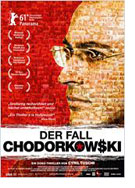

Opening 17 Nov 2011
Directed by:
Cyril Tuschi
Writing credits:
Cyril Tuschi
It’s hard to believe that director Cyril Tuschi’s documentary on Mikhail Borissowitsch Chodorkowski would pose a national threat to the security of Russia, but it must have seemed that way since twice during the making of this film he had all of his film material stolen from him. His film begins with a simple question in an austere landscape; have you ever heard of Mikhail Borissowitch Chodorkowski? For many young Russians, he is a criminal, or they simply have never simply heard of him. It just shows how much Putin has worked to erase Chodorkowski’s memory from the people’s minds and have given him a negative image, a man who was a simple criminal. This is hard to believe since he was once the richest man in Russia. He was the mastermind behind the economic change in the banking world of communism which helped move Russia to the current system that it has in place today.
Tuschi’s documentary not only describes the rise and fall of the richest man in Russia but at the same time describes the economic and political metamorphosis of the Soviet Union into the current modern Russia. What is refreshing about this documentary is that Tuschi doesn’t side with Chodorkowski but tries to tell his story from the facts and interviews with people whom he knew. He presents facts and lets us decide, especially since Chodorkowski is rotting somewhere in Siberia and it doesn’t look like he will be coming home soon. (Shelly Schoeneshoefer)
Russia’s most prominent prisoner is Michail Khodorkovsky, who was arrested October 25, 2003. Since then, his case has been brought before the courts several times, and he will serve his term in Siberia until probably 2016. His supporters say that his crime was to confront Vladimir Putin, former President and now Prime Minister of Russia. His critics, of whom surprisingly many are normal, Russian citizens, say that he stole money from the state and is, therefore, rightly in jail. In 1989 he founded Menatep, the first commercial bank in Russia. In 1995 he bought the Russian oil company YUKOS for 300 million dollars, and soon thereafter it was worth six billion, making him the world’s richest man under 40 years old. Perhaps his biggest mistake was trying to run YUKOS like a capitalist company and seeking contacts in the West where he intended to sell 25% of YUKOS stock. Or perhaps his biggest mistake was assuming that he was immune to Putin’s henchmen; he refused to leave the country (although several of his contemporaries had already left and seven of Russia’s richest citizens did swiftly leave the day of Khokorkovsky’s arrest).
German Director Cyril Tuschi (whose great-grandparents came from St. Petersburg) researched Khodorkovsky for five years, travelling to Siberia, Moscow, the United States, Israel, England, etc. He includes historical newsreels and live interviews with Khodorkovsky’s mother, his first wife and his oldest son (who studies in the U.S.), former German Secretary of State Joschka Fischer, and former partners with YUKOS such as Michail Brudno who lives in Israel. It’s not surprising that no high-ranking politician in Russia’s present government would grant an interview. It’s not until the end of the film that Tuschi can speak with Khodorkovsky for ten minutes while the prisoner sits in a glass cage in court.
The viewer can derive his own conclusions from Tuschi’s facts, which make Khordokovsky neither a God nor a sinner. We see Khordokovsky rise in self-confidence and become more good looking (perhaps under the influence of his second wife?). We see his fall and wonder at his naiveté; now, in court, he exudes almost religious calmness/holiness. Comic-like illustrations, much like those in Marjane Satrapi’s Persepolis, fill in the blanks for areas which could not be filmed. Khodorkovsky played at the 2011 Berlinale. Whether it will play in Russia is up for speculation, although Tuschi is still allowed into the country and plans to show his film at the Russian Artdocfest on December 2. (Becky Tan)